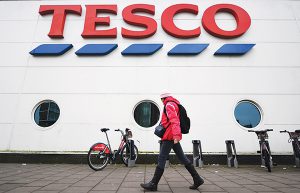Heinz canning baked beans in Tesco is only the start of the supermarket food fights. But this is one battle that Britain’s biggest retailer can win.
US grocery giant Kraft Heinz Food Co has temporarily stopped supplying Tesco Plc with most of
its products, including ketchup and baked beans, after the grocer said it would not pass on “unjustifiable price increases†to its customers.
It’s not a surprise that hostilities between producers and retailers have broken out.
During the first-quarter reporting season, while consumer-goods companies including Unilever Plc, Nestle SA and Procter & Gamble Co reported strong sales growth, escalating commodity costs meant little change in their profitability. As they pay more for everything from plastic to palm oil, they are trying to pass this inflation onto consumers in the form of higher prices on supermarket shelves. They may be justified: Up to now, the volume of goods being bought hasn’t really changed, indicating that consumers aren’t balking at higher prices.
But even with escalating expenses, producers’ margins still vastly exceed those of food retailers. And it’s the big brands especially that have more room to absorb current pressures. Kraft Heinz has also had some of the highest margins in the sector in recent years, thanks to its talent for cutting costs.
It’s little wonder then that Tesco is pushing back.
Grocers already generate wafer-thin margins. And they will be mindful that the last time they increased prices, around a decade ago, they drove customers into the aisles of the German discounters Aldi and Lidl. When they eventually cut prices, they hemorrhaged even more profit.
The so-called Big Four
UK supermarkets — Tesco, J Sainsbury Plc, Asda Group Ltd and Wm Morrison Supermarkets Ltd — will want to do everything to avoid the same fate this time around. Although Asda and Morrison have some cushion from fatter fuel margins, they also have borrowing costs to service now that they’re in private hands.
What’s more, all of the grocers have developed a suite of private labels as substitutes to the big brands. Tesco said it had “plenty of alternatives†to Heinz. And let’s not forget that the majority of brands sold at Aldi and Lidl are
private label.
There’s mileage for Tesco in portraying itself as a consumer champion. It is trying to compete with Aldi by matching hundreds of its prices to those of the discount store and offering special deals for the 20 million members of its Clubcard loyalty program. What better way to show off its value credentials than sticking up for customers crushed by the cost-of-living crisis?
The current situation is reminiscent of so-called “Marmitegate†in 2016, when Unilever halted deliveries to Tesco after a similar spat over price rises. The two resolved the issue, but the retailer came out looking like the winner.
Both Heinz and the
supermarket said they were keen for a resolution to “Beansgate.†Tesco shouldn’t be in too much of a hurry though. It can afford to put the squeeze on the ketchup maker.
—Bloomberg
 The Gulf Time Newspaper One of the finest business newspapers in the UAE brought to you by our professional writers and editors.
The Gulf Time Newspaper One of the finest business newspapers in the UAE brought to you by our professional writers and editors.
